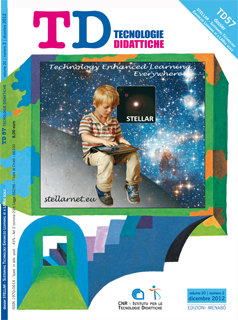Lo studio Delphi di Stellar sul Technology Enhanced Learning
Contenuto principale dell'articolo
Abstract
Dettagli dell'articolo
Sezione
Gli autori che pubblicano su questa rivista accettano le seguenti condizioni:
- Gli autori mantengono i diritti sulla loro opera e cedono alla rivista il diritto di prima pubblicazione dell'opera, contemporaneamente licenziata sotto una Licenza Creative Commons CC BY 4.0 Attribution 4.0 International License.
- Gli autori possono aderire ad altri accordi di licenza non esclusiva per la distribuzione della versione dell'opera pubblicata (es. depositarla in un archivio istituzionale o pubblicarla in una monografia), a patto di indicare che la prima pubblicazione è avvenuta su questa rivista.
- Gli autori possono diffondere la loro opera online (es. in repository istituzionali o nel loro sito web) prima e durante il processo di submission, poiché può portare a scambi produttivi e aumentare le citazioni dell'opera pubblicata (Vedi The effect of Open Access).
Riferimenti bibliografici
Broad W. J. (2006). The oracle: The lost secrets and hidden message of ancient Delphi. New York: Penguin Press.
Chaffin W., Talley W. (1980). Individual stability in Delphi studies. Technological Forecasting and Social Change, 16 (1), pp. 67-73.
Dajani J. S., Sincoff M. Z., Talley W. K. (1979). Stability and agreement criteria for the termination of Delphi studies. Technological Forecasting and Social Change, 13 (1), pp. 83-90.
Häder M. (2009). Delphi-Befragungen [Delphi surveys: A workbook] (2nd ed.). Wiesbaden (DE): Verlag für Sozialwissenschaften.
Jansen M. (2009). Research on technology enhanced learning in Europe. A survey on recent advances, emerging trends and future developments (unpublished diploma thesis) Albert-Ludwigs-Universität Freiburg, Freiburg (DE).
Kaendler C., Plesch C., Deiglmayr A., Diziol D., Rummel N., Spada H. (2011). Emerging tensions in the future of technology- enhanced learning: first results of an international Delphi study. In H. Spada, G. Stahl, N. Miyake (eds.). Connecting Computer-Supported Collaborative Learning to Policy and Practice: CSCL2011 Conference Proceedings. Volume II - Short Papers e Posters. Hong Kong (RPC): International Society of the Learning Sciences, pp. 676-680.
Linstone H. A., Turoff M. (1975). The Delphi method: techniques and applications. Illinois, USA: Addison-Wesley Educational Publishers Inc.
Plesch, C., Jansen, M., Deiglmayr, A., Rummel, N. Spada, H., Heinze, N., e Cress, U. (2010). Opinions on future research themes for technology-enhanced learning (TEL): A Delphi study. In S. L. Wong et al. (eds.). Proceedings of the 18th International Conference on Computers in Education. Putrajaya, Malaysia: Asia-Pacific Society for Computers in Education, pp. 703-707.
Rowe G., Wright G. (1999). The Delphi technique as a forecasting tool: issues and analysis. International Journal of Forecasting, 15 (4), pp. 353-375.
Rowe G., Wright G. (2001). Expert opinions in forecasting: the role of the Delphi technique. Principles of forecasting: a handbook for researchers and practitioners, pp. 125-144.
Scheibe M., Skutsch M., Schofer J. (1975). Experiments in Delphi Methodology. In H. A. Linstone, M. Turoff (eds.). The Delphi Method: Techniques and Applications. Reading, MA, USA: Addison-Wesley, pp. 262-287.
Spada H., Plesch C., Wiedmann M., Kaendler, C., Deiglmayr, A., Mullins, D. e Rummel, N. (2012). Final report on the STELLAR Delphi study - Future directions for TEL and TEL research: Areas of Tension, Core Research Areas, and Grand Challenge Problems (STELLAR deliverable 1.6). http://www.stellarnet.eu/repository/deliverable_ repository_list/ (ultima consultazione 11/09/2012).
STELLAR (2009). Description of Work. http://www.stellarnet.eu (ultima consultazione 11/09/2012). Sutherland R., Eagle S., Gillet D., Joubert M., Scott P. (2012). Stellar. Una rete di eccellenza nel settore del Technology Enhanced Learning. TD-Tecnologie Didattiche, 20 (3), (questo numero).
Thompson M. (2009). Considering the implication of variations within Delphi research. Family Practice, 26 (5), pp. 420-424.
Van de Ven A., Delbecq A. (1974). The effectiveness of nominal, Delphi, and interacting group decision making processes. Academy of Management Journal, pp. 605- 621.

